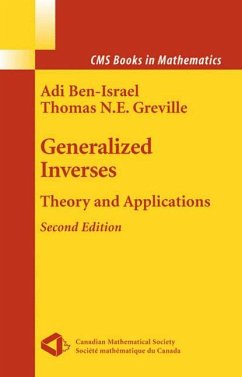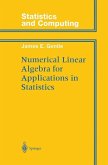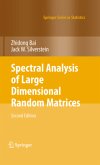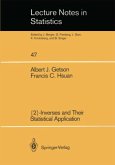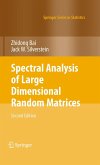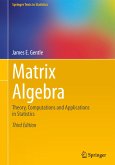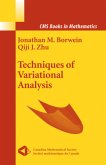This second edition accounts for many major developments in generalized inverses while maintaining the informal and leisurely style of the 1974 first edition. Added material includes a chapter on applications, new exercises, and an appendix on the work of E.H. Moore.
1. The Inverse of a Nonsingular Matrix It is well known that every nonsingular matrix A has a unique inverse, ?1 denoted by A , such that ?1 ?1 AA = A A =I, (1) where I is the identity matrix. Of the numerous properties of the inverse matrix, we mention a few. Thus, ?1 ?1 (A ) = A, T ?1 ?1 T (A ) =(A ) , ? ?1 ?1 ? (A ) =(A ) , ?1 ?1 ?1 (AB) = B A , T ? where A and A , respectively, denote the transpose and conjugate tra- pose of A. It will be recalled that a real or complex number ? is called an eigenvalue of a square matrix A, and a nonzero vector x is called an eigenvector of A corresponding to ?,if Ax = ?x. ?1 Another property of the inverse A is that its eigenvalues are the recip- cals of those of A. 2. Generalized Inverses of Matrices A matrix has an inverse only if it is square, and even then only if it is nonsingular or, in other words, if its columns (or rows) are linearly in- pendent. In recent years needs have been felt in numerous areas of applied mathematics for some kind of partial inverse of a matrix that is singular or even rectangular.
Hinweis: Dieser Artikel kann nur an eine deutsche Lieferadresse ausgeliefert werden.
1. The Inverse of a Nonsingular Matrix It is well known that every nonsingular matrix A has a unique inverse, ?1 denoted by A , such that ?1 ?1 AA = A A =I, (1) where I is the identity matrix. Of the numerous properties of the inverse matrix, we mention a few. Thus, ?1 ?1 (A ) = A, T ?1 ?1 T (A ) =(A ) , ? ?1 ?1 ? (A ) =(A ) , ?1 ?1 ?1 (AB) = B A , T ? where A and A , respectively, denote the transpose and conjugate tra- pose of A. It will be recalled that a real or complex number ? is called an eigenvalue of a square matrix A, and a nonzero vector x is called an eigenvector of A corresponding to ?,if Ax = ?x. ?1 Another property of the inverse A is that its eigenvalues are the recip- cals of those of A. 2. Generalized Inverses of Matrices A matrix has an inverse only if it is square, and even then only if it is nonsingular or, in other words, if its columns (or rows) are linearly in- pendent. In recent years needs have been felt in numerous areas of applied mathematics for some kind of partial inverse of a matrix that is singular or even rectangular.
Hinweis: Dieser Artikel kann nur an eine deutsche Lieferadresse ausgeliefert werden.
From the reviews of the second edition: "The book under review which is the second edition of the 30 years ago published one provides a detailed survey of generalized inverses and their main properties ... . An important feature of this book is the over 600 exercises ... . Each chapter ends with the section 'Suggested further reading'. These sections provide excellent additional references on topics treated ... . it can be used profitably by graduate or advanced undergraduate students of mathematics and computer science, and by PhD students ... ." (Róbert Rajkó, Acta Scientiarum Mathematicarum, Vol. 71, 2005) "Each chapter is accompanied by suggestions for further reading, while the bibliography contains 901 references. ... The book contains 450 exercises at different levels of difficulty, many of which are solved in detail. This feature makes it suitable either for reference and self-study or for use as a classroom text. It can be used profitably by graduate students or advanced undergraduate students ... ." (Nicholas Karampetakis, Zentralblatt MATH, Vol. 1026, 2004)

